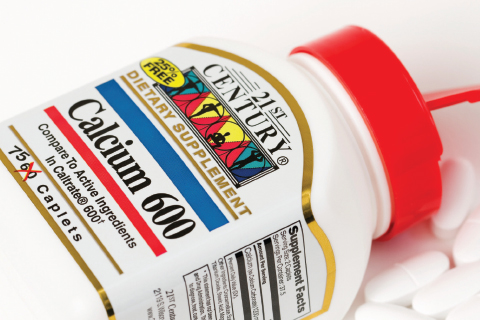Vitamin D and Calcium—Supplements to Know

Vitamins and mineral supplements have taken a bruising in the last year. Several studies have shown they offer little protection against cardiovascular disease or cancer in healthy adults, and some editorials have gone as far as saying they are complete waste of money in healthy adults. Clients who meet with me because they want to make healthy lifestyle choices are often very confused as to what supplements they should be taking—and rightly so. They frequently assume they should be adding to their diet in some way. Let’s take a look at two of the most commonly used supplements, vitamin D and calcium, and what research has to say about who should take them and who really doesn’t need them at all.
Vitamin D
Vitamin D plays many roles; we regularly hear about it in conjunction with calcium, particularly as pertains to absorption. There’s been a lot of information regarding the role of vitamin D in maintaining a healthy immune system and the possible protection it could provide against certain cancers. If your doctor suspects you are deficient in vitamin D, a test can check your vitamin D level. Optimal levels for healthy individuals determined by the Institute of Medicine are 20 ng/ml (50 nmol/l). If your levels are lower, your doctor will most likely prescribe vitamin D. But what about the rest of us? Would we benefit from extra vitamin D? The jury is still out. Studies seem to indicate that, in regard to bone mineral density, supplemental vitamin D is most beneficial when combined with calcium. With regard to cancer, the Department of Health and Human Services noted, “Further research is needed to determine whether vitamin D inadequacy in particular increases cancer risk, whether greater exposure to the nutrient is protective, and whether some individuals could be at increased risk of cancer because of vitamin D exposure. Taken together, however, studies to date do not support a role for vitamin D, with or without calcium, in reducing the risk of cancer.” If you are not deficient and choose to supplement, please keep the dosage below the tolerable upper intake level (TUL) of 4,000 IU for adults.
Calcium
We often hear that supplemental calcium improves bone density, but how does that extra calcium affect other areas of the body? Excessive supplemental calcium has been linked to production of kidney stones. Recent research has also indicated that doses exceeding the daily requirement for healthy adults may increase the risk of cardiovascular disease. Further research is needed, but you should use both dietary and supplemental calcium when calculating total daily intake. If you do choose to supplement, check the label; there are two forms of calcium. Calcium carbonate is best absorbed when taken with food, and calcium citrate can be absorbed well with or without food. Large doses of calcium, however, cannot be absorbed at once, so spread it throughout the day. If you are taking 1,000 mg total, for example, you are most likely to absorb the calcium in two 500 mg doses, one taken in the morning and another in the evening.
Just because you can buy supplements without a prescription doesn’t mean they are harmless. Vitamins and minerals have a set TUL. If taking supplements, please talk with your pharmacist to ensure they are not interacting with any prescribed medications; you’d be surprised at how often this happens.
Bottom Line: Unless you are deficient or have been prescribed a supplement by a doctor, aim to maximize your intake of vitamins and minerals from the food you eat. Food works synergistically, the way it was created, and a pill in a bottle can’t duplicate that. Also, play the devil’s advocate as you consider adding these to your diet; don’t forget that supplement companies are also profit driven, so be sure you actually need what you are buying and consuming and not just swayed by advertisements.






